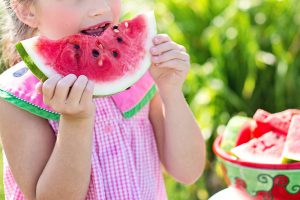Type 1 Diabetes
If you or your child have recently been diagnosed with Type 1 Diabetes you should be referred to a Diabetes Dietitian who can help you understand and manage your condition.
Type 1 Diabetes Sick Day Rules
It is important that people with diabetes follow Sick Day Rules if they become unwell. When you have diabetes, being ill can cause your blood sugars to increase as your body tries to fight off the illness.
- Check your blood sugar at least every four hours, including during the night, and check your ketones. If your blood sugar level is high or if ketones are present, contact your diabetes team
- Do not stop taking your insulin
- Keep eating and drinking
If you can’t keep food down, try snacks or drinks with carbohydrates in to give you energy. Try to sip sugary drinks (such as fruit juice or non-diet cola or lemonade) or suck on glucose tablets or sweets like jelly beans. Letting fizzy drinks go flat may help keep them down.
If you’re vomiting, or not able to keep fluids down, get medical help as soon as possible.
Click here for more advice.
Type 2 Diabetes
If you have Type 2 diabetes or have been recently diagnosed you can find more information on the British Dietetic Association Food Fact Sheet, click here.
Type 2 Diabetes Sick Day Rules
It is important that people with diabetes follow Sick Day Rules if they become unwell. When you have diabetes, being ill can cause your blood sugars to increase as your body tries to fight off the illness.
- If you are taking insulin do not stop
- Keep eating and drinking
If you can’t keep food down, try snacks or drinks with carbohydrates in to give you energy. Try to sip sugary drinks (such as fruit juice or non-diet cola or lemonade) or suck on glucose tablets or sweets like jelly beans. Letting fizzy drinks go flat may help keep them down.
If you’re vomiting, or not able to keep fluids down, get medical help as soon as possible.
Click here for more advice.
Gestational Diabetes (Diabetes in Pregnancy)
If you have recently been diagnosed with Gestational Diabetes you should be referred to an Antenatal or Diabetes Dietitian who can help you understand and manage your condition.
Useful Sites and Resources
Diabetes UK is the leading charity for people living with diabetes in the UK, providing information, dietary tips, recipes, resources and links to support groups in your local area click here.





 Many of us are experiencing a change to our lifestyle due to COVID-19. You might be isolating, working from home or home schooling the kids. We are all trying to find a balance and adjust to a “new normal”.
Many of us are experiencing a change to our lifestyle due to COVID-19. You might be isolating, working from home or home schooling the kids. We are all trying to find a balance and adjust to a “new normal”.